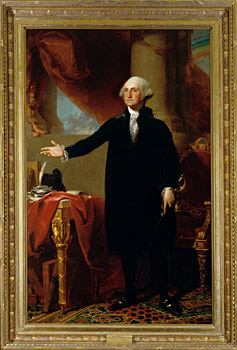Jed Kirschbaum / The Baltimore Sun
Light from a red laser scans a resin reproduction of the 1789 lower denture
originally carved from Hippopatamus ivory for George Washington.
How Do We Know What We Know About the Past?
In March of 2010, I was chair of the Human Rights Committee in Pekin, IL. We invited Professor Loewen to Pekin to discuss his book, Sundown Towns: A Hidden Dimension of American Racism and to spend time in our community updating his research. He brought two university research assistants with him and I invited students from the Bradley University courses in which I was enrolled. Much of what I knew and had experienced about my town's past had shaped how I thought of myself in juxtaposition to the world-at-large.
Perhaps because I had moved out-of-state for nearly a decade, I (like Professor Loewen), noticed that issues of racism were dramatically less of a problem in my community. Yet outside the community, the negative stereotypes (of my town) still existed and flourished.
Then in June of 2010, while attending the local farmer's market downtown, my spouse (who also grew up in Pekin), pointed out a historical marker we had never seen on a local bank building. I had a visceral reaction to this new knowledge, a moment of clear consciousness where I could physically feel my paradigm shift in regards to the place in which I had been born.
I continued researching the Union League and my amazement grew, as I discovered this story was completely unknown within our town's boundaries - this sign (left) even put up on a day when the newspaper was closed for a holiday.
The power of information and the passion that it fuels inside of you is something that I can share and teach to my students.
Historians Ask Questions!
They find patterns in the past, they connect the past to the present, they recognize that what we know about our past is influenced as much by opinion, as it is from provable facts. Do we all make history - yes! Am I making history - yes! Will I teach my students that they too make history - YES!
 |
| Interactive Historical Thinking Poster for Secondary Teachers |




No comments:
Post a Comment